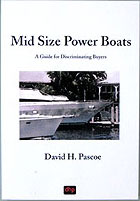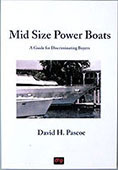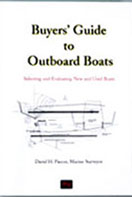Chapter 12
Design Details
Table of Contents
Man, It's Cool
Important Changes in Boat Building
Computers, CCR & CAD-CAM
Eliminating Wood: Enter New Materials
High Maintenance, Low Maintenance and too Much Clutter
Ergonomics
Integral Platforms
Exhaust Ports
Side Exhausts
Platform as Patio
Boarding Problems
Cockpit & Under Deck Storage
Fish Boxes
Exterior Upholstery
Fold-Down Cockpit Seats
Hardtops
Transom Doors
Cockpit Scuppers
Windshields and Wipers
Excerpt
Many people who own boats have come to the conclusion that the term "pleasure boating" is a misnomer; that "work boating" may be more appropriate.
In this chapter I'll discuss many of the reasons why boats can become more work than expected, mostly the result of the accumulation of little things that can make it so, what to look for, the rights and the wrongs, how to avoid them and possibly how to get around them when they appear unavoidable.
The failure to really think through the details of design elements of a boat often end up becoming costly problems to boat owners.
While I can make you aware of some of the more egregious problems, we have to bear in mind that in the real world there is no such thing as a perfect boat.
On virtually all boats we will find that the builder/designers have done some pretty dumb things as well as some pretty smart things.
A thirty-five foot boat is a large, complex vessel that we expect to be able to purchase at what we consider a reasonable price, and it's just not reasonable to expect that it's going to be perfect.
That, however, should not deter us from trying to get our money's worth, while at the same time avoiding the trap of trying to find perfection in a production boat.
As a result of millions of boats being designed and built over about 70 years of yacht building in the U.S., the industry does have a lot of experience and common wisdom that pretty much sets a generally accepted common standard on the way things should be. It is those deviations from the common standard that we'll be dealing with in this chapter.
Hey Man, It's Cool
In the interest of attracting inexperienced buyers, marketing people come up with a lot of cool ideas. Ideas that appear to be cool to the uninitiated, but would definitely get a cool reception by people who know better. We'll take a look at some of those cool things and explain why "cool" might turn to ice cold.
Important Changes in Boat Building
It goes without saying that improvements in technology and process take place over time. Since this book addresses fiberglass boats since the days when they were first built, we're looking at over four decades of change.
During those years, change has tended to take place not gradually, but in a number of great leaps, quantum changes that obsolete all that has gone before it. The introduction of the molded fiberglass boat was one. The electronics revolution another. Perhaps surprisingly, some of the most important innovations have occurred quietly and with little fanfare or notice.
- A Guide to Discriminating Buyers
by David H. Pascoe
Soft Cover
512 pages
Publisher: D. H. Pascoe & Co., Inc.
Published: 2003
Language: English
ISBN-10: 0965649636
ISBN-13: 9780965649636
In Stock
David Pascoe - Biography
David Pascoe is a second generation marine surveyor in his family who began his surveying career at age 16 as an apprentice in 1965 as the era of wooden boats was drawing to a close.
Certified by the National Association of Marine Surveyors in 1972, he has conducted over 5,000 pre purchase surveys in addition to having conducted hundreds of boating accident investigations, including fires, sinkings, hull failures and machinery failure analysis.
Over forty years of knowledge and experience are brought to bear in following books. David Pascoe is the author of:
- "Mid Size Power Boats" (2003)
- "Buyers’ Guide to Outboard Boats" (2002)
- "Surveying Fiberglass Power Boats" (2001, 2nd Edition - 2005)
- "Marine Investigations" (2004).
In addition to readers in the United States, boaters and boat industry professionals worldwide from over 70 countries have purchased David Pascoe's books, since introduction of his first book in 2001.
In 2012, David Pascoe has retired from marine surveying business at age 65.
On November 23rd, 2018, David Pascoe has passed away at age 71.







Normally orders ship the same day, if placed before 12:00 PM Eastern time.